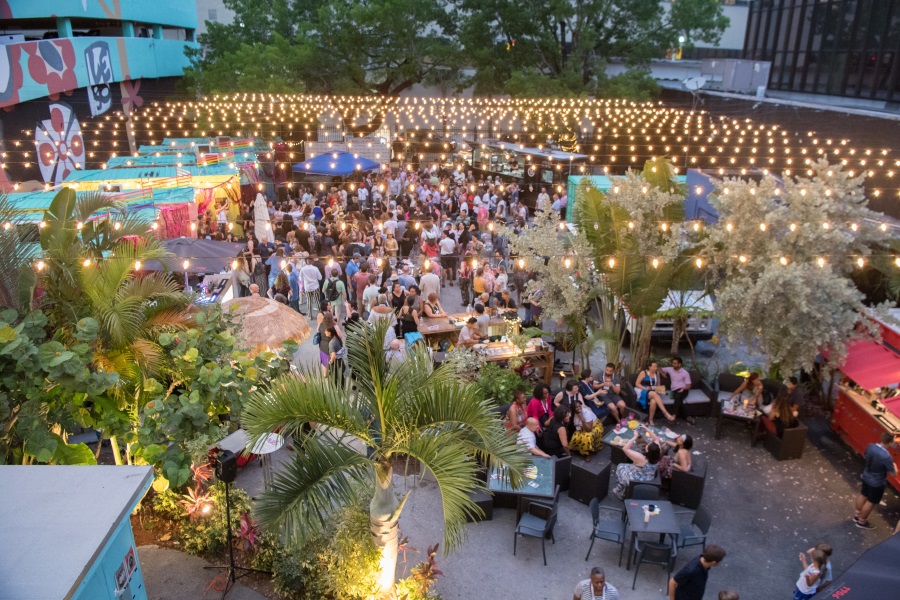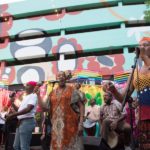Miami is a stunner, from her sandy beaches and Art Deco architecture to the colorful walls of Wynwood and her magnificent sunsets. Yet her beauty shines most brightly when we celebrate what makes her so stunning: her people. Miami’s beautiful theatre people were on full display at the Theatre Communications Group x Centro Cultural Español Block Party celebrating local and national theatres of color, held at Microtheater Miami, June 4, on the eve of TCG’s National Conference, which ran June 5-7.
And they were there to welcome others into the fold of Miami’s rich diversity after that day’s gathering of national networks of color as part of the next cohort of TCG’s Equity, Diversity and Inclusion Institute. Part of TCG’s multi-year, six-point EDI Initiative to transform the national theatre field into a more equitable, inclusive, and diverse community, the Institute comprised a full day of pre-conference programming. The Block Party was a chance to cap the day with celebration, and to allow the local community to connect with its national counterparts with a night of food, music, dancing, and performance. Just as the crowd of people who came to revel, the food trucks were a celebration of our diversity, with the Latin-Asian fusion of Tumbao Buns Miami and Monsieur Poutine, which offered everything from beignets to seafood poutine. The night commenced with full stomachs and full hearts as the crowd danced the night away. Whether it was world pop or ’60s soul, it was clear that it was a party, Miami style. The crowd rocked from side to side to the music as people began to make connections through music and the performances that brought us all there. The joy of the night was undeniable.
Still, for all her diversity, Miami is not perfect. Though the city is majority “minority” (Hispanic and/or people of color), you wouldn’t necessarily know that to look at her theatres. There is work to be done. But while we have different identities, gender expressions, and cultural traditions, we share a common language: the theatre. The Block Party brought local and national theatres together to celebrate that common language, while embracing social justice through theatre, as many local communities’ groups were invited to attend and spread awareness on topics ranging from LGBTQ+ homelessness (Pridelines), the school-to-prison pipeline (Dream Defenders), immigration (Florida Immigrant Coalition), and conversations about racism (South Florida People of Color).
The night began with performances from Hola Hi, the duo formed by Angelina de los Rosarios and Paul Curtis. These young musicians and songwriters have a unique ability to merge Britpop and R&B with the rhythms of the Dominican Republic and Louisiana brass band. As Curtis put it, “In our music, we try to describe the wonderful, multicolored canvas that is life. The difficult times are inevitable, but you discover a strength and personal growth through these experiences, and so one can appreciate positive moments.”
The night’s entertainment continued with Big Chief Brass, a multicultural collective with musicians hailing from New Orleans, Dominican Republic, Peru, Cuba, Jamaica, and Haiti presenting music at its rawest, unfiltered, and untamed—no processors, no playback, no drum machines, no mics. Just sweat, breath, and heart.
We next heard from Black Theatre Commons and Black Theatre Network, who were among the theatre networks of color who gathered for the Institute during the day. A representative of the Black Theatre Network spoke about their upcoming conference, Black Theatre: Unapologetically Black, slated to focus on Black joy, Black empowerment, and Black perseverance in a convening of theatre leaders, scholars, and practitioners for panels, workshops, celebrations, and networking, July 25-29 in Winston-Salem, N.C. And while David Mitchell, program manager with Black Theatre Commons, shared that BTC is “a relatively new Black theatre service organization,” their initiatives included “a national archival project” in which they’ll set to work “archiving artifacts of all of our major brick-and-mortar organizations.”
Soon after came a celebration one of Miami’s own theatres of color, African Heritage Youth Theatre. AHYT, the in-house youth acting apprenticeship program at the African Heritage Cultural Arts Center (AHCAC), serves youth aged 9 to 17. For the Block Party, AHYT participants Jamaine Benjamin Jr. and Darrian Whitehead performed an excerpt from For Black Boys Who Have Considered Homicide When the Streets Were Too Much. As Jazmin Jones-Oliver, the theatre and facility manager for AHYT, told me, “It’s important for my students to see themselves. It’s important for them to feel welcomed in this space, because we’re in Liberty City, a very impoverished, low-income area, and those students that are in that area who may not be able to see the arts will have access to the arts.” Also performing at the Block Party was AHYT’s Voices Of Heritage, which strives to develop members’ repertoire while enhancing their music knowledge through theory and application.
Also on hand was the Consortium of Asian American Theatres & Artists, whose mission is to advance the field of Asian American theatre through a national network of organizations and artists. CAATA also forms alliances with other theatre groups of different affinities to advance mutual goals cooperatively and to exchange ideas and strategies. Andi Meyer, a CAATA board member, took the mic to note that the consortium will host several outreach programs in Hawaii to bolster engagement for their next conference, in August 2020.
Armando Huipe represented the Latinx Theatre Commons (LTC) as its new producer. This national movement uses a commons-based approach to seek to transform the narrative of the American theatre while amplifying the visibility of Latinx performance-making, and to champion equity through advocacy, art-making, convening, and scholarship. The next gathering is Miami in Motion, July 12-14, which will gather artists, scholars, administrators, and advocates from the Miami Latinx theatre community and beyond. The purpose of the convening is to provide space for networking and interdisciplinary collaborative opportunities, and to engage in dialogue aimed at advancing career sustainability.
Golden Thread and Noor Theatre represented the Middle Eastern and North African theatre community. San Francisco-based Golden Thread Productions, the first American theatre company devoted to the Middle East, serve as a developmental catalyst and artistic home to artists at various stages of their careers, while the New York-based Noor Theatre is an Obie-winning company dedicated to supporting, developing, and producing the work of theatre artists of Middle Eastern descent. Like Golden Thread’s, Noor’s programming supports work at different stages of development, whether early drafts of new plays or world premiere productions.
The celebration got kicked up a notch with Betsayda Machado y La Parranda El Clavo, an ensemble who just finished the world premiere of their new musical, Viva La Parranda! at Miami New Drama. Hailing from Venezuela, the troupe reached international acclaim in 2017 with their first album, going from recording under a mango tree to being named among the best albums of the year by The New York Times and performing at Lincoln Center and the Kennedy Center.
The night continued with Lillian Manzor, professor at the University of Miami and founding director of the Cuban Theater Digital Archive, a digital platform designed to preserve Cuban theatre. Lillian was representing FUNDarte, a local nonprofit producing and presenting organization, which presented a piece from Cuba Queer, an anthology of texts by gay Cubans, at Microtheater Miami that night.
Marlen Muñoz, the coordinator for Microtheater Miami, then officially welcomed the crowd to the company’s work, which is to create unique theatrical experiences in Spanish and English inside shipping containers. These original 15-minute plays in English and Spanish included performances from Colors by Lucia Miranda, Amal by the Combat Hippies, Cuba Queer by FUNDarte, El Matasuegras by OMG, The Best of Broadway directed by Miguel Sahid/Sociedad Actoral Hispanoamericana, and Stonewall by Luciano Cortes and Lauren Gaspard. As audiences weaved in and out of each container, the energy and excitement was tangible.
Ignacio Moralejo Ledo, director of Centro Cultural Español Miami and hence one of the evening’s hosts, seemed gratified by the event. “Working with TCG was amazing and very organic. It is amazing now that people know our place!”
To cap a fun-filled night of musical and theatre performances, Karla Croqueta kept the party going. The current reigning Ultimate Miami Drag Queen, Croqueta is loud, colorful, and entertaining. The Block Party held this celebratory tone with dancing to the music of DJ Esta, who has showered her musical prowess on various social events and high-end music venues, while maintaining a career as a programming maven for Miami-based cultural institutions.
Michel Hausmann, artistic director of Miami New Drama and a member of the TCG conference host committee, may have summed up the theme of the day best. “The success of Miami New Drama proves that theatre that is done by the artist of color is not a side dish but the main dish, and it is economically successful as well. Theatre by artists of color is the future of the American theatre.”
If last week’s Block Party is any guide, the future looks as beautiful as Miami.
Cristina Pla-Guzman, a writer and educator based in Miami, is among this year’s TCG Rising Leaders of Color.
















